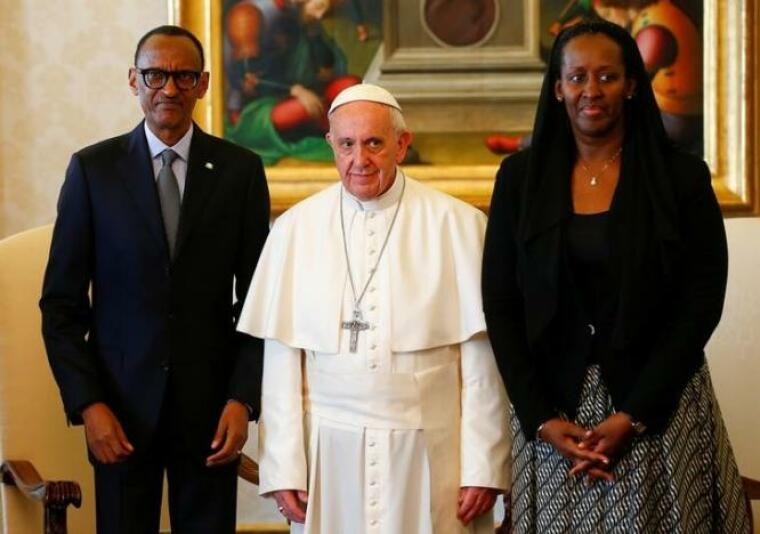Pope Francis apologizes for church's complicity in Rwandan genocide

Pope Francis has asked for forgiveness for the "sins and failings" of the Catholic church during the 1994 Rwandan genocide, which claimed the lives of an estimated 800,000 people, most of whom belonged to the Tutsi ethnic group.
During a meeting with Rwandan President Paul Kagame at the Vatican on Monday, the pope acknowledged that there were priests and nuns who "succumbed to hatred and violence, betraying their own evangelical mission," Premier reported.
According to a statement from the Vatican, the pope also "expressed the desire that this humble recognition of the failings of that period, which unfortunately disfigured the face of the church, may contribute to a 'purification of memory' and may promote, in hope and renewed trust, a future of peace."
Both the local church and the Vatican had been reluctant to issue an apology for the church's complicity in the genocide, despite pressure from the Rwandan government. The local church had maintained that the church officials who committed crimes had acted individually.
In 1996, St. John Paul II stated that the church was not to blame for what took place in Rwanda. "The church in itself cannot be held responsible for the misdeeds of its members who have acted against evangelical law," he said in a letter to Rwandan bishops.
During the massacre, thousands of people took refuge in Protestant and Catholic churches only to be exterminated by surrounding militias. According to Christian Today, researchers have suggested that the church was "deeply implicated" in the genocide, with its buildings serving as "killing fields."
Last year, the Roman Catholic Church in Rwanda issued an apology for its role in the massacre.
In a statement read throughout the churches in the country on Nov. 20, the bishops expressed their regret that church members "violated their oath of allegiance to God's commandments" and that some Catholics took part in planning, aiding and carrying out the killings.
However, the Rwandan government dismissed the apology at the time, saying it was "profoundly inadequate."
Kagame, who led the rebellion that ultimately ended the 100-day violence, said in December that he did not understand why the church was reluctant to issue an apology, given that popes have apologized for much lesser crimes.
On Monday, he expressed his appreciation for the pope's statements and said "a new chapter in relations" had begun. He added that Pope Francis' willingness to ask for forgiveness was "an act of courage and moral high standing" that was characteristic of the pope.
 Christians don't have to affirm transgenderism, but they can’t express that view at work: tribunal
Christians don't have to affirm transgenderism, but they can’t express that view at work: tribunal Archaeology discovery: Medieval Christian prayer beads found on Holy Island
Archaeology discovery: Medieval Christian prayer beads found on Holy Island Presbyterian Church in America votes to leave National Association of Evangelicals
Presbyterian Church in America votes to leave National Association of Evangelicals Over 50 killed in 'vile and satanic' attack at Nigerian church on Pentecost Sunday
Over 50 killed in 'vile and satanic' attack at Nigerian church on Pentecost Sunday Ukrainian Orthodox Church severs ties with Moscow over Patriarch Kirill's support for Putin's war
Ukrainian Orthodox Church severs ties with Moscow over Patriarch Kirill's support for Putin's war Islamic State kills 20 Nigerian Christians as revenge for US airstrike
Islamic State kills 20 Nigerian Christians as revenge for US airstrike Man who served 33 years in prison for murder leads inmates to Christ
Man who served 33 years in prison for murder leads inmates to Christ


 Nigerian student beaten to death, body burned over ‘blasphemous’ WhatsApp message
Nigerian student beaten to death, body burned over ‘blasphemous’ WhatsApp message 'A new low': World reacts after Hong Kong arrests 90-year-old Cardinal Joseph Zen
'A new low': World reacts after Hong Kong arrests 90-year-old Cardinal Joseph Zen Iran sentences Christian man to 10 years in prison for hosting house church worship gathering
Iran sentences Christian man to 10 years in prison for hosting house church worship gathering French Guyana: Pastor shot dead, church set on fire after meeting delegation of Evangelicals
French Guyana: Pastor shot dead, church set on fire after meeting delegation of Evangelicals ‘Talking Jesus’ report finds only 6% of UK adults identify as practicing Christians
‘Talking Jesus’ report finds only 6% of UK adults identify as practicing Christians Mission Eurasia ministry center blown up in Ukraine, hundreds of Bibles destroyed: 'God will provide'
Mission Eurasia ministry center blown up in Ukraine, hundreds of Bibles destroyed: 'God will provide' Church holds service for first time after ISIS desecrated it 8 years ago
Church holds service for first time after ISIS desecrated it 8 years ago Burger King apologizes for 'offensive campaign' using Jesus' words at the Last Supper
Burger King apologizes for 'offensive campaign' using Jesus' words at the Last Supper Uganda: Muslims abduct teacher, burn him inside mosque for praying in Christ’s name
Uganda: Muslims abduct teacher, burn him inside mosque for praying in Christ’s name